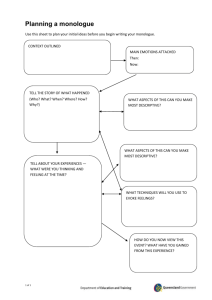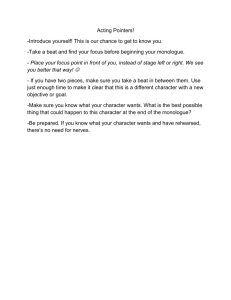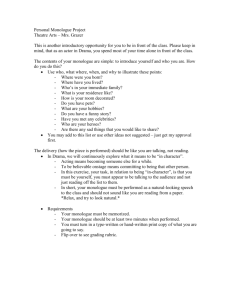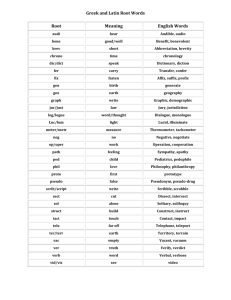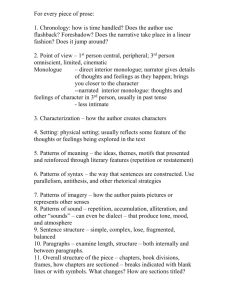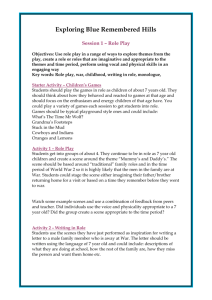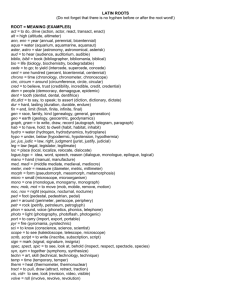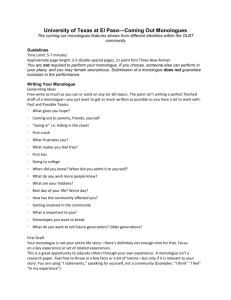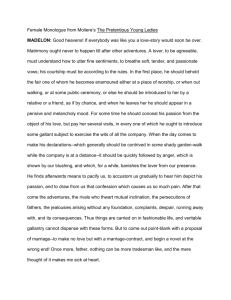monologues for females
advertisement
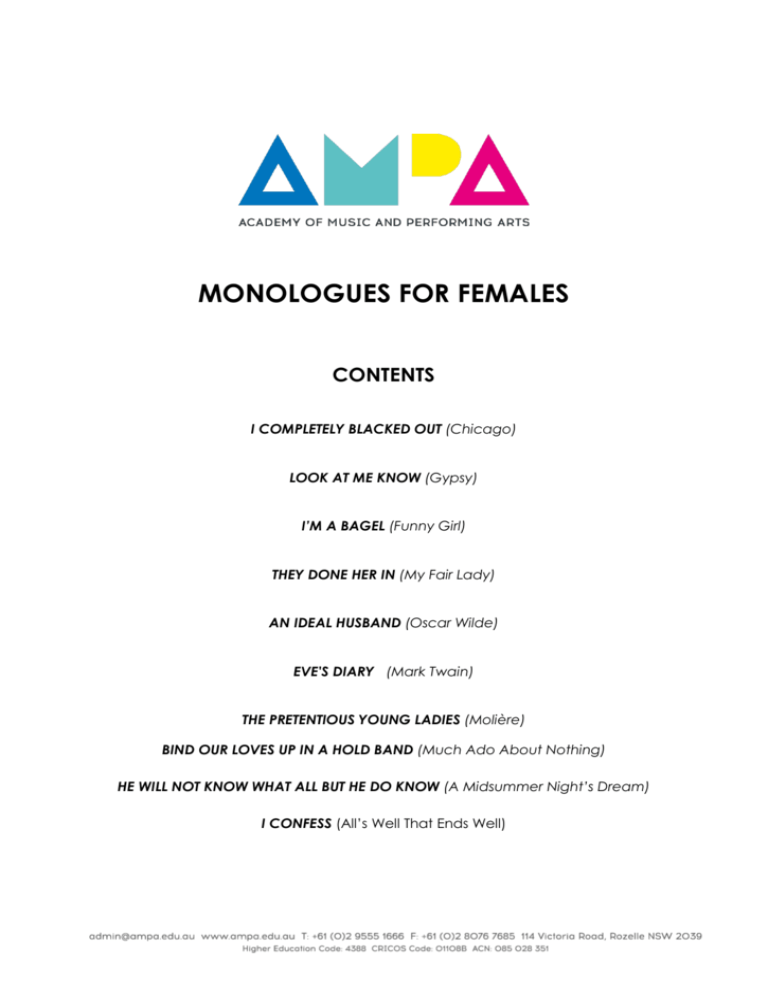
MONOLOGUES FOR FEMALES CONTENTS I COMPLETELY BLACKED OUT (Chicago) LOOK AT ME KNOW (Gypsy) I’M A BAGEL (Funny Girl) THEY DONE HER IN (My Fair Lady) AN IDEAL HUSBAND (Oscar Wilde) EVE'S DIARY (Mark Twain) THE PRETENTIOUS YOUNG LADIES (Molière) BIND OUR LOVES UP IN A HOLD BAND (Much Ado About Nothing) HE WILL NOT KNOW WHAT ALL BUT HE DO KNOW (A Midsummer Night’s Dream) I CONFESS (All’s Well That Ends Well) ‘I Completely Blacked Out' from Chicago Character name: Velma Kelly Gender: Female Age Range: 23 — 30 Show: Chicago Duration: 0 — 1 minutes Monologue Type: dramatic,contemporary Notes: None My sister, Veronica, and I had this double act and my husband, Charlie, traveled around with us. Now for the last number in our act, we did these 20 acrobatic tricks in a row, one, two, three, four, five... Splits, spread eagles, back flips, flip flops, one right after the other. Well, this one night before the show we are in a hotel Cicero, the three of us, sittin' up in a hotel room, boozin' and havin' a few laughs and we ran out of ice, so I went out to get some. I come back, open the door And there's Veronica and Charlie doing Number Seventeen -the spread eagle. Well, I was in such a state of shock, I completely blacked out. I can't remember a thing. It wasn't until later, when I was washing the blood off my hands I even knew they were dead. 'Look At Me Now' from Gypsy Character name: Louise Gender: Female Age Range: 15 — 23 Show: Gypsy Duration: 0 — 1 minutes Monologue Type: dramatic,contemporary Notes: None I said turn it off! Nobody laughs at me, because I laugh first. At me. Me from Seattle. Me with no education. Me with no talent, as you've kept reminding me my whole life! Well, Mama, look at me now. Look! Look where I live. Look at my friends. Look where I'm going. I'm not staying in burlesque, I'm moving. Maybe up maybe down. But wherever I'm going, I'm having the time of my life, because for the first time, it is my life! And I love it! I love every second of it! I am Gypsy Rose Lee! And I love her! And if you don't you can just clear out! Now! 'I'm a Bagel' from Funny Girl Character name: Fanny Brice Gender: Female Age Range: 18 — 30 Show: Funny Girl Duration: 0 — 1 minutes Monologue Type: comedic Notes: None Suppose all ya ever had for breakfast was onion rolls. Then one day, in walks (gasp) a bagel! You'd say, 'Ugh, what's that?' Until you tried it! That's my problem - I'm a bagel on a plate full of onion rolls. Nobody recognizes me! Listen, I got 36 expressions. Sweet as pie and tough as leather. And that's six expressions more than all those...Barrymores put together. Instead of just kicking me, why don't they give me a lift? Well, it must be a plot, 'cause they're scared that I got...such a gift! 'Cause I'm the greatest star, I am by far, but no one knows it. Wait - they're gonna hear a voice, a silver flute. They'll cheer each toot, hey, she's terrific!, when I expose it. Now can't you see to look at me that I'm a natural Camille, and as Camille, I just feel, I've so much to offer. Kid, I know I'd be divine because I'm a natural cougher (coughs) - some ain't got it, not a lump. I'm a great big clump of talent! Laugh, they'll bend in half. Did you ever hear the story about the travelling salesman? A thousand jokes, stick around for the jokes. A thousand faces. I reiterate. When you're gifted, then you're gifted. These are facts, I've got no axe to grind. Ay! What are ya, blind? In all of the world so far, I'm the greatest star! No autographs, please. What? You think beautiful girls are gonna stay in style forever? I should say not! Any minute now they're gonna be out! FINISHED! Then it'll be my turn! 'They Done Her In' from My Fair Lady Character name: Eliza Doolittle Gender: Female Age Range: 17 — 30 Show: My Fair Lady Duration: 0 — 1 minutes Monologue Type: comedic Notes: None My aunt died of influenza, so they said. But it's my belief they done the old woman in. Yes Lord love you! Why should she die of influenza when she come through diphtheria right enough the year before? Fairly blue with it she was. They all thought she was dead. But my father, he kept ladling gin down her throat. Then she come to so sudden that she bit the bowl off the spoon. Now, what would you call a woman with that strength in her have to die of influenza, and what become of her new straw hat that should have come to me? Somebody pinched it, and what I say is, them that pinched it, done her in. Them she lived with would have killed her for a hatpin, let alone a hat. And as for father ladling the gin down her throat, it wouldn't have killed her. Not her. Gin was as mother's milk to her. Besides, he's poured so much down his own throat that he knew the good of it. AN IDEAL HUSBAND A monologue from the play by Oscar Wilde MABEL CHILTERN: Well, Tommy has proposed to me again. Tommy really does nothing but propose to me. He proposed to me last night in the music-room, when I was quite unprotected, as there was an elaborate trio going on. I didn't dare to make the smallest repartee, I need hardly tell you. If I had, it would have stopped the music at once. Musical people are so absurdly unreasonable. They always want one toz be perfectly dumb at the very moment when one is longing to be absolutely deaf. Then he proposed to me in broad daylight this morning, in front of that dreadful statue of Achilles. Really, the things that go on in front of that work of art are quite appalling. The police should interfere. At luncheon I saw by the glare in his eye that he was going to propose again, and I just managed to check him in time by assuring him that I was a bimetallist. Fortunately I don't know what bimetallism means. And I don't believe anybody else does either. But the observation crushed Tommy for ten minutes. He looked quite shocked. And then Tommy is so annoying in the way he proposes. If he proposed at the top of his voice, I should not mind so much. That might produce some effect on the public. But he does it in a horrid confidential way. When Tommy wants to be romantic he talks to one just like a doctor. I am very fond of Tommy, but his methods of proposing are quite out of date. I wish, Gertrude, you would speak to him, and tell him that once a week is quite often enough to propose to any one, and that it should always be done in a manner that attracts some attention. EVE'S DIARY A monologue from the book by Mark Twain NOTE: This monologue is reprinted from Eve's Diary. Mark Twain. New York: Harper & Brothers, 1906. EVE: We are getting along very well now, Adam and I, and getting better and better acquainted. He does not try to avoid me any more, which is a good sign, and shows that he likes to have me with him. That pleases me, and I study to be useful to him in every way I can, so as to increase his regard. During the last day or two I have taken all the work of naming things off his hands, and this has been a great relief to him, for he has no gift in that line, and is evidently very grateful. He can't think of a rational name to save him, but I do not let him see that I am aware of his defect. Whenever a new creature comes along I name it before he has time to expose himself by an awkward silence. In this way I have saved him many embarrassments. I have no defect like this. The minute I set eyes on an animal I know what it is. I don't have to reflect a moment; the right name comes out instantly, just as if it were an inspiration, as no doubt it is, for I am sure it wasn't in me half a minute before. I seem to know just by the shape of the creature and the way it acts what animal it is. When the dodo came along he thought it was a wildcat--I saw it in his eye. But I saved him. And I was careful not to do it in a way that could hurt his pride. I just spoke up in a quite natural way of pleasing surprise, and not as if I was dreaming of conveying information, and said, "Well, I do declare, if there isn't the dodo!" I explained--without seeming to be explaining--how I know it for a dodo, and although I thought maybe he was a little piqued that I knew the creature when he didn't, it was quite evident that he admired me. That was very agreeable, and I thought of it more than once with gratification before I slept. How little a thing can make us happy when we feel that we have earned it! THE PRETENTIOUS YOUNG LADIES A monologue from the play by Molière NOTE: This monologue is reprinted from The Dramatic Works of Molière. New York: R. Worthington Publishers, 1880. MADELON: Good heavens! If everybody was like you a love-story would soon be over. Matrimony ought never to happen till after other adventures. A lover, to be agreeable, must understand how to utter fine sentiments, to breathe soft, tender, and passionate vows; his courtship must be according to the rules. In the first place, he should behold the fair one of whom he becomes enamoured either at a place of worship, or when out walking, or at some public ceremony; or else he should be introduced to her by a relative or a friend, as if by chance, and when he leaves her he should appear in a pensive and melancholy mood. For some time he should conceal his passion from the object of his love, but pay her several visits, in every one of which he ought to introduce some gallant subject to exercise the wits of all the company. When the day comes to make his declarations--which generally should be contrived in some shady garden-walk while the company is at a distance--it should be quickly followed by anger, which is shown by our blushing, and which, for a while, banishes the lover from our presence. He finds afterwards means to pacify us, to accustom us gradually to hear him depict his passion, and to draw from us that confession which causes us so much pain. After that come the adventures, the rivals who thwart mutual inclination, the persecutions of fathers, the jealousies arising without any foundation, complaints, despair, running away with, and its consequences. Thus things are carried on in fashionable life, and veritable gallantry cannot dispense with these forms. But to come out point-blank with a proposal of marriage--to make no love but with a marriage-contract, and begin a novel at the wrong end! Once more, father, nothing can be more tradesman like, and the mere thought of it makes me sick at heart. 'Bind our Loves up in a Holy Band' from Much Ado About Nothing BEATRICE: [Coming forward] What fire is in mine ears? Can this be true? Stand I condemned for pride and scorn so much? Contempt, farewell! and maiden pride, adieu! No glory lives behind the back of such. And, Benedick, love on; I will requite thee, Taming my wild heart to thy loving hand: If thou dost love, my kindness shall incite thee To bind our loves up in a holy band; For others say thou dost deserve, and I Believe it better than reportingly. Taming my wild heart to thy loving hand: If thou dost love, my kindness shall incite thee To bind our loves up in a holy band; For others say thou dost deserve, and I Believe it better than reportingly. 'He Will Not Know What All But He Do Know' from A Midsummer Night's Dream HELENA: How happy some o'er other some can be! Through Athens I am thought as fair as she. But what of that? Demetrius thinks not so; He will not know what all but he do know. And as he errs, doting on Hermia's eyes, So I, admiring of his qualities. Things base and vile, holding no quantity, Love can transpose to form and dignity. Love looks not with the eyes, but with the mind, And therefore is winged Cupid painted blind. Nor hath Love's mind of any judgment taste; Wings, and no eyes, figure unheedy haste. And therefore is Love said to be a child, Because in choice he is so oft beguiled. As waggish boys in game themselves forswear, So the boy Love is perjured everywhere. For ere Demetrius looked on Hermia's eyne, He hailed down oaths that he was only mine; And when this hail some heat from Hermia felt, So he dissolved, and show'rs of oaths did melt. I will go tell him of fair Hermia's flight. Then to the wood will he to-morrow night Pursue her; and for this intelligence If I have thanks, it is a dear expense. But herein mean I to enrich my pain, To have his sight thither and back again. 'I Confess' from All's Well That Ends Well HELENA: I confess Here on my knee before high heaven and you, That before you, and next unto high heaven, I love your son. My friends were poor but honest; so's my love. Be not offended, for it hurts not him That he is loved of me. I follow him not By any token of presumptuous suit, Nor would I have him till I do deserve him; Yet never know how that desert should be. I know I love in vain, strive against hope; Yet in this captious and intensible sieve I still pour in the waters of my love And lack not to lose still. Thus, Indian-like, Religious in mine error, I adore The sun that looks upon his worshipper But knows of him no more. My dearest madam, Let not your hate encounter with my love, For loving where you do; but if yourself, Whose agèd honor cites a virtuous youth, Did ever in so true a flame of liking, Wish chastely and love dearly, that your Dian Was both herself and Love, O, then give pity To her whose state is such that cannot choose But lend and give where she is sure to lose; That seeks not to find that her search implies, But, riddle-like, lives sweetly where she dies.
